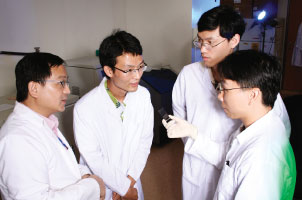
Assoc Prof Too Heng-Phon in discussion with students from the CPE programme
FRP Title: Molecular Engineering of Bio/Chemical Pathways & Process Science for the Pharmaceutical Industry
Duration: July 2006 - June 2014
Principal Co-Investigators:
Singapore
Prof Raj Rajagopalan (NUS), Assoc Prof Li Zhi (NUS), Dr Mark Saeys (NUS), Dr Saif A Khan (NUS), Assoc Prof Too Heng- Phon (NUS), Prof Chung Tai-Shung, Neal (NUS), Dr Rudiyanto Gunawan (NUS)
MIT
Prof Bernhardt L Trout, Prof Daniel I C Wang, Assoc Prof Alan T Hatton, Prof Stephen L Buchwald, Prof Kenneth A Smith, Prof Gregory N Stephanopoulos, Assoc Prof Patrick S Doyle
Research Objectives and Progress:
The major goal of the CPE FRP is the development of molecular science and engineering for the pharmaceutical industry in Singapore. The three interconnected research thrusts together with their respective accomplishments for the past year are as follow:
- Metabolic Engineering - molecular biotechnology for engineering-targeted biological pathways and development of efficient biocatalytic systems for oxidoreductions with cofactor recycling.
The team has successfully used a multivariate-modular pathway to optimise and engineer the DXP pathway in E. coli. This has led to a high production of taxadiene with a more than 15,000 fold increase.
- Chemical Catalysis – engineering catalysts at the molecular and nanometer scales
The researchers have experimentally confirmed the theoretical prediction that aryl fluoride, an important agrochemical and pharmaceuticals, is kinetically feasible to form by reductive elimination using specific biarylmonophosphine ligands.
- Downstream Processing – molecular engineering for separation technology, purification and formulation
The key accomplishments for the past year include:
- Invention of a microfludic method for controlled generation of highly structured hydrogel particles which take advantage of flow focusing;
- Development of droplet-based microfludic processes for chemical and nanomaterials synthesis;
- Development of Extended Interface Structure Analysis (EISA) – an interface of hybrid molecular simulations and thermodynamic analysis
Collaborating Research Institutes or Companies:
Novartis
